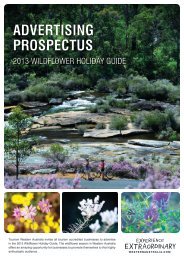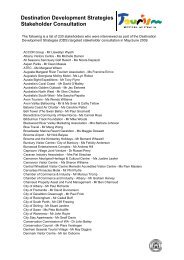A Strategic Approach to the Caravan and Camping Industry 2012
A Strategic Approach to the Caravan and Camping Industry 2012
A Strategic Approach to the Caravan and Camping Industry 2012
Create successful ePaper yourself
Turn your PDF publications into a flip-book with our unique Google optimized e-Paper software.
Develop collateral for ‘selling’ <strong>the</strong> opportunity <strong>to</strong> interested parties <strong>to</strong> include<br />
running in-depth workshops <strong>to</strong> transfer skills <strong>and</strong> underst<strong>and</strong>ing about <strong>the</strong><br />
opportunity <strong>and</strong> required commitment <strong>to</strong> Indigenous l<strong>and</strong>owners/ lease holders<br />
Provide a framework for seeking interested parties <strong>to</strong> establish partnerships<br />
<br />
<br />
Provide indicative development concepts which take in<strong>to</strong> account best practice<br />
environmental sustainability <strong>and</strong> remote logistical constraints<br />
Identify support, training, employment <strong>and</strong> economic development opportunities<br />
for Indigenous participants <strong>and</strong> surrounding communities<br />
<br />
<br />
<br />
<br />
<br />
o<br />
o<br />
Indigenous l<strong>and</strong>owners or leaseholders; <strong>and</strong><br />
<strong>Caravan</strong> industry experts – e.g. management or ownership groups<br />
Structuring sample partnership agreements <strong>and</strong> lease agreements (l<strong>and</strong> <strong>to</strong> be<br />
leased or sub leased <strong>to</strong> <strong>the</strong> new partnership entity)<br />
Investigating potential management models considering options such as:<br />
o<br />
o<br />
<strong>Industry</strong> expert / management group could be responsible for financial<br />
management, administration, bookings, marketing, online payments etc.<br />
The Indigenous proponent could be responsible for guest relations,<br />
cleaning; routine maintenance <strong>and</strong> provision of value added <strong>to</strong>uring<br />
components such as cultural <strong>to</strong>urs, fishing charters, hire equipment etc.<br />
(alternatively <strong>the</strong>se could be delivered by separate micro enterprises or<br />
pooled labour resources arrangements).<br />
Secure ongoing support from DEEWR <strong>and</strong>/or IBA <strong>to</strong> provide men<strong>to</strong>ring <strong>to</strong><br />
participating Indigenous proponents as required improving <strong>and</strong> developing <strong>the</strong>ir<br />
skills <strong>and</strong> commitment. Also <strong>to</strong> help troubleshoot any issues which may arise <strong>and</strong><br />
have <strong>the</strong> potential <strong>to</strong> negatively impact on <strong>the</strong> partnership / relationship<br />
Cost out <strong>and</strong> seek grant funding if required for <strong>the</strong> development <strong>and</strong> installation<br />
of physical infrastructure (ablution facilities, laundry, camp kitchen etc.) - this may<br />
be able <strong>to</strong> be funded through Indigenous specific subsidised loan programs (e.g.<br />
through Indigenous Business Australia or <strong>the</strong> Indigenous Capital Assistance<br />
Scheme) or funded by one or both of <strong>the</strong> partners<br />
Provide a framework for agreements which could stipulate key performance<br />
indica<strong>to</strong>rs (KPI’s) for both parties which if not met could require <strong>the</strong> placement of<br />
an employed staff member who would be made responsible for meeting KPI’s as<br />
an interim or long term measure. KPI’s could include receiving satisfac<strong>to</strong>ry guest<br />
ratings on service, cleanliness <strong>and</strong> maintenance of facilities<br />
<br />
Through access <strong>the</strong> National Workforce Development Fund <strong>and</strong> DEEWR’s Skills<br />
Connect program (which provides enterprises with access <strong>to</strong> a range of skills <strong>and</strong><br />
workforce development programs <strong>and</strong> funding) ensure that <strong>the</strong> workers engaged<br />
on <strong>the</strong> program develop <strong>the</strong> necessary skills for sustainability of <strong>the</strong> enterprises.<br />
Positive Impacts<br />
Indigenous <strong>and</strong> Private Enterprise Partnerships for <strong>the</strong> delivery of caravan <strong>and</strong><br />
camping facilities on Indigenous L<strong>and</strong> would deliver much needed capacity in areas of<br />
high dem<strong>and</strong>. It would open up accessibility <strong>to</strong> remote <strong>and</strong> spectacular parts of <strong>the</strong><br />
State <strong>and</strong> provide visi<strong>to</strong>rs with awesome nature based experiences, with <strong>the</strong> added<br />
cultural component providing a unique dimension <strong>to</strong> <strong>the</strong> camping experience. It<br />
would provide a sustainable opportunity for visi<strong>to</strong>rs <strong>to</strong> learn about <strong>and</strong> share<br />
Indigenous culture in exclusive locations, with a business structure that strikes a<br />
balance between cultural considerations <strong>and</strong> mainstream consumer dem<strong>and</strong>s.<br />
The Jackson Report (2009) identified that Australia needs <strong>to</strong> focus more clearly on<br />
developing our <strong>to</strong>urism industry products based on our four key competitive<br />
advantages, one of which was Indigenous culture. It noted that Indigenous <strong>to</strong>urism “is<br />
a key point of differentiation for Australia in a highly competitive international <strong>to</strong>urism<br />
market.” It fur<strong>the</strong>r stated that “<strong>to</strong>urism offers enormous potential <strong>to</strong> Indigenous<br />
communities, both <strong>to</strong> create sustainable jobs <strong>and</strong> employment <strong>and</strong> as a means <strong>to</strong><br />
protect <strong>and</strong> nurture cultural <strong>and</strong> environmental heritage.” 87 This supports many of<br />
<strong>the</strong> strategies identified in <strong>the</strong> Aboriginal Tourism Strategy for Western Australia 2011<br />
- 2015. 88<br />
The Federal Government’s draft Indigenous Economic Development Strategy Draft<br />
identified ‘cultural <strong>to</strong>urism, natural resource management <strong>and</strong> arts industries’ as one<br />
of five areas of competitive advantage collectively Indigenous Australians have. It<br />
states that “...this strategy builds on <strong>the</strong>se areas of competitive advantage where<br />
<strong>the</strong>y exist, as well as those areas that maximise Indigenous Australians’ opportunities<br />
87 The Jackson Report On behalf of <strong>the</strong> Steering Committee Informing <strong>the</strong> National Long-Term Tourism<br />
Strategy, Commonwealth of Australia, 2009.<br />
88 Aboriginal Tourism Strategy for Western Australia 2011 - 2015, TWA <strong>and</strong> WAITOC, 2011.<br />
A <strong>Strategic</strong> <strong>Approach</strong> <strong>to</strong> <strong>Caravan</strong> <strong>and</strong> <strong>Camping</strong> Tourism in Western Australia Page 97



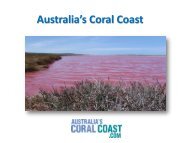
![Annual Report 2002 - 2003 [pdf ] - Tourism Western Australia](https://img.yumpu.com/27124309/1/186x260/annual-report-2002-2003-pdf-tourism-western-australia.jpg?quality=85)
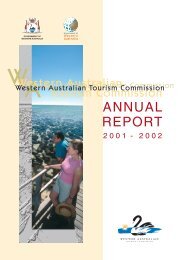
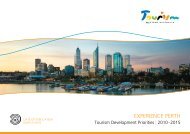
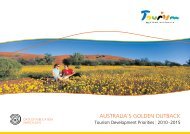
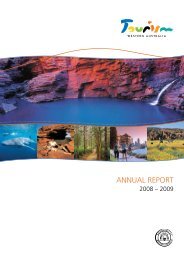
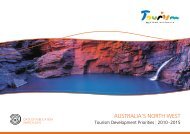

![Our Direction in China 2012 - 2015 [pdf ] - Tourism Western Australia](https://img.yumpu.com/27124271/1/184x260/our-direction-in-china-2012-2015-pdf-tourism-western-australia.jpg?quality=85)
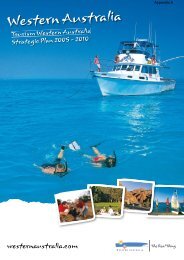
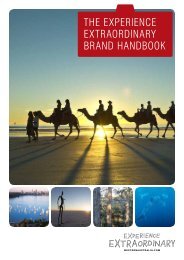
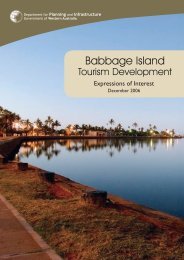
![Naturebank Program 2011 [pdf ] - Tourism Western Australia](https://img.yumpu.com/27124244/1/184x260/naturebank-program-2011-pdf-tourism-western-australia.jpg?quality=85)
